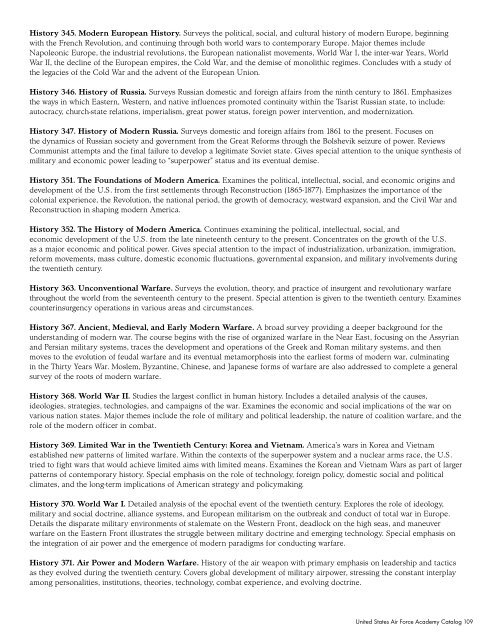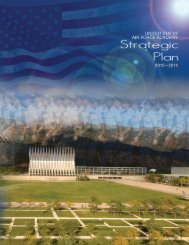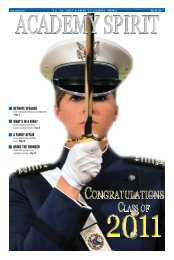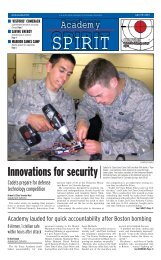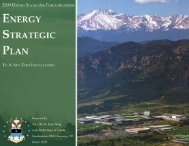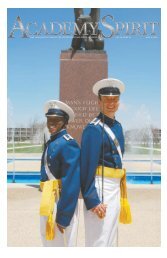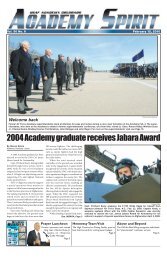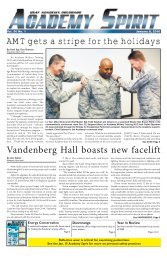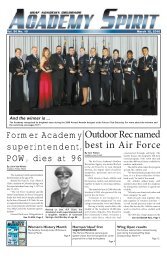2008-2009 Catalog - United States Air Force Academy
2008-2009 Catalog - United States Air Force Academy
2008-2009 Catalog - United States Air Force Academy
Create successful ePaper yourself
Turn your PDF publications into a flip-book with our unique Google optimized e-Paper software.
History 345. Modern European History. Surveys the political, social, and cultural history of modern Europe, beginning<br />
with the French Revolution, and continuing through both world wars to contemporary Europe. Major themes include<br />
Napoleonic Europe, the industrial revolutions, the European nationalist movements, World War I, the inter-war Years, World<br />
War II, the decline of the European empires, the Cold War, and the demise of monolithic regimes. Concludes with a study of<br />
the legacies of the Cold War and the advent of the European Union.<br />
History 346. History of Russia. Surveys Russian domestic and foreign affairs from the ninth century to 1861. Emphasizes<br />
the ways in which Eastern, Western, and native influences promoted continuity within the Tsarist Russian state, to include:<br />
autocracy, church-state relations, imperialism, great power status, foreign power intervention, and modernization.<br />
History 347. History of Modern Russia. Surveys domestic and foreign affairs from 1861 to the present. Focuses on<br />
the dynamics of Russian society and government from the Great Reforms through the Bolshevik seizure of power. Reviews<br />
Communist attempts and the final failure to develop a legitimate Soviet state. Gives special attention to the unique synthesis of<br />
military and economic power leading to “superpower” status and its eventual demise.<br />
History 351. The Foundations of Modern America. Examines the political, intellectual, social, and economic origins and<br />
development of the U.S. from the first settlements through Reconstruction (1865-1877). Emphasizes the importance of the<br />
colonial experience, the Revolution, the national period, the growth of democracy, westward expansion, and the Civil War and<br />
Reconstruction in shaping modern America.<br />
History 352. The History of Modern America. Continues examining the political, intellectual, social, and<br />
economic development of the U.S. from the late nineteenth century to the present. Concentrates on the growth of the U.S.<br />
as a major economic and political power. Gives special attention to the impact of industrialization, urbanization, immigration,<br />
reform movements, mass culture, domestic economic fluctuations, governmental expansion, and military involvements during<br />
the twentieth century.<br />
History 363. Unconventional Warfare. Surveys the evolution, theory, and practice of insurgent and revolutionary warfare<br />
throughout the world from the seventeenth century to the present. Special attention is given to the twentieth century. Examines<br />
counterinsurgency operations in various areas and circumstances.<br />
History 367. Ancient, Medieval, and Early Modern Warfare. A broad survey providing a deeper background for the<br />
understanding of modern war. The course begins with the rise of organized warfare in the Near East, focusing on the Assyrian<br />
and Persian military systems, traces the development and operations of the Greek and Roman military systems, and then<br />
moves to the evolution of feudal warfare and its eventual metamorphosis into the earliest forms of modern war, culminating<br />
in the Thirty Years War. Moslem, Byzantine, Chinese, and Japanese forms of warfare are also addressed to complete a general<br />
survey of the roots of modern warfare.<br />
History 368. World War II. Studies the largest conflict in human history. Includes a detailed analysis of the causes,<br />
ideologies, strategies, technologies, and campaigns of the war. Examines the economic and social implications of the war on<br />
various nation states. Major themes include the role of military and political leadership, the nature of coalition warfare, and the<br />
role of the modern officer in combat.<br />
History 369. Limited War in the Twentieth Century: Korea and Vietnam. America’s wars in Korea and Vietnam<br />
established new patterns of limited warfare. Within the contexts of the superpower system and a nuclear arms race, the U.S.<br />
tried to fight wars that would achieve limited aims with limited means. Examines the Korean and Vietnam Wars as part of larger<br />
patterns of contemporary history. Special emphasis on the role of technology, foreign policy, domestic social and political<br />
climates, and the long-term implications of American strategy and policymaking.<br />
History 370. World War I. Detailed analysis of the epochal event of the twentieth century. Explores the role of ideology,<br />
military and social doctrine, alliance systems, and European militarism on the outbreak and conduct of total war in Europe.<br />
Details the disparate military environments of stalemate on the Western Front, deadlock on the high seas, and maneuver<br />
warfare on the Eastern Front illustrates the struggle between military doctrine and emerging technology. Special emphasis on<br />
the integration of air power and the emergence of modern paradigms for conducting warfare.<br />
History 371. <strong>Air</strong> Power and Modern Warfare. History of the air weapon with primary emphasis on leadership and tactics<br />
as they evolved during the twentieth century. Covers global development of military airpower, stressing the constant interplay<br />
among personalities, institutions, theories, technology, combat experience, and evolving doctrine.<br />
<strong>United</strong> <strong>States</strong> <strong>Air</strong> <strong>Force</strong> <strong>Academy</strong> <strong>Catalog</strong> 109


